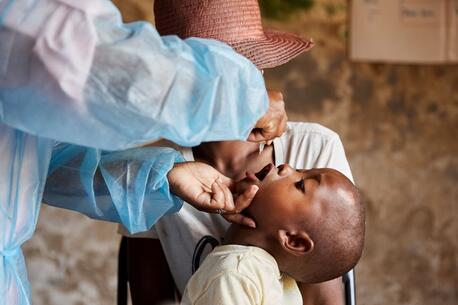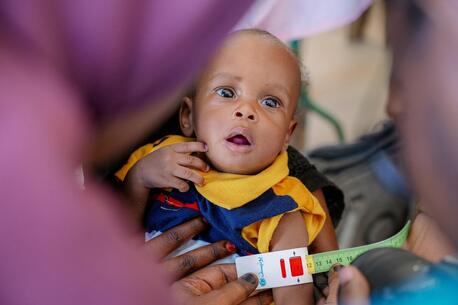
A Lifeline for Aseel, a Severely Malnourished 2-Year-Old in Yemen
It's the silence that visitors to Yemen's therapeutic feeding centers notice first. The beds are full, but the children waiting for treatment are often too weak to make a sound.
At Al-Sabeen Hospital in Sana'a City, Ali Mohammad is worried about his 2-year-old nephew, Aseel, a tiny boy who has suffered from severe acute malnutrition (SAM) since he was 2 months old. Without treatment, SAM can be fatal.
Without treatment, severe acute malnutrition can be fatal
"I've experienced this before, when my kids were ill," says Mohammad. "The first was my daughter. She was suffering from malnutrition. We took her to the malnutrition unit, but she died. She was 5 years old. Then next was her brother. The same happened to him; he was 3."
"I hope they can help [Aseel] so that we don't lose him too, like I lost my kids. One after the other and ... they died in front of my eyes."
Watch the video to learn more about 2-year-old Aseel:
Seven years of conflict, rising poverty and spiraling inflation have put nutritious food out of reach for many families in Yemen. The country has long battled with some of the world's highest malnutrition rates.
Yemen's ongoing civil war has left more than 2 million children under age 5 acutely malnourished
UNICEF is working with partners to address Yemen's child malnutrition crisis, providing lifesaving nutrition support in more than 4,000 health care facilities and 100 therapeutic feeding centers across the country, so children like Aseel can receive the urgent care they need to survive.
"It is not too late to help," says Dr. Suha Abdelilah Al-Zarqa, UNICEF Yemen health and nutrition officer. "There is a solution to hunger."
Yemen is the most difficult place in the world to be a child. UNICEF and partners are on the ground, working to protect children's lives and futures. You can help.
Learn more about how UNICEF is providing lifesaving support for malnourished children in Yemen.
Top photo: Two-year-old Aseel's mother and uncle brought him to the UNICEF-supported therapeutic feeding center at Al-Sabeen Hospital in Sana'a City, Yemen for treatment. © UNICEF/UN0523307/Fuad. Video edited by Tong Su for UNICEF USA.
HOW TO HELP
There are many ways to make a difference
War, famine, poverty, natural disasters — threats to the world's children keep coming. But UNICEF won't stop working to keep children healthy and safe.
UNICEF works in over 190 countries and territories — more places than any other children's organization. UNICEF has the world's largest humanitarian warehouse and, when disaster strikes, can get supplies almost anywhere within 72 hours. Constantly innovating, always advocating for a better world for children, UNICEF works to ensure that every child can grow up healthy, educated, protected and respected.
Would you like to help give all children the opportunity to reach their full potential? There are many ways to get involved.





